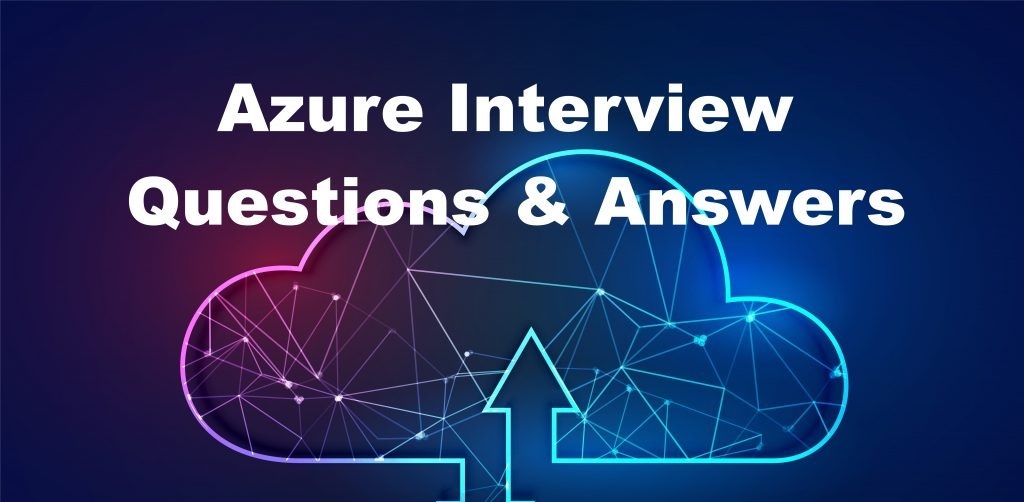Frequently Asked Cloud Computing Interview Questions and Answers
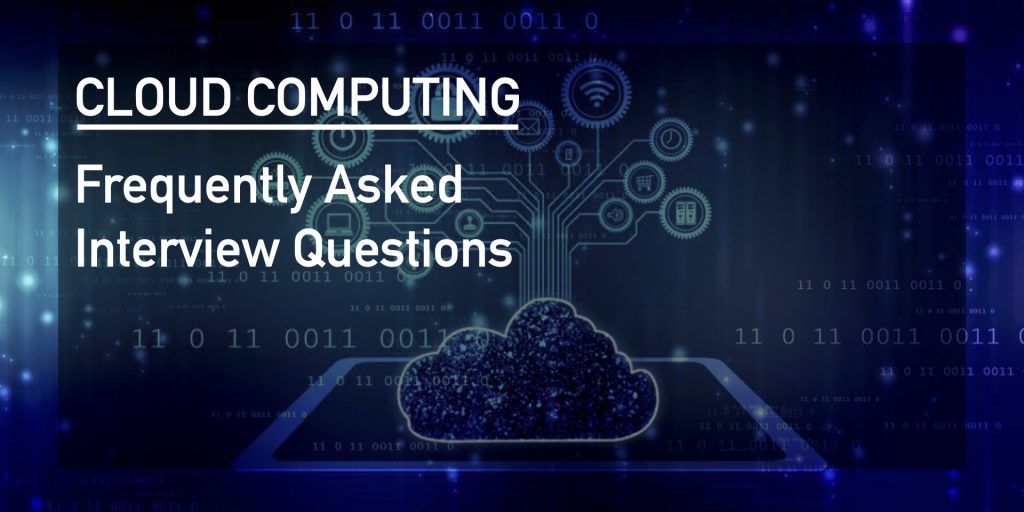
Cloud computing is currently one of the hottest fields to build a career for any technical professional. Larger businesses and smaller organizations are all moving towards the cloud. With the massive cloud adoption, there has been a sudden surge in cloud-related jobs, but a dearth of qualified professionals. Hence, it is the right time for you to build a career in this field. We have, therefore, curated a list of frequently asked cloud computing interview questions
Basic Cloud Computing Interview Questions
- What is cloud computing?
- How is the cloud data centre different from a traditional data centre?
- What is a cloud service and what are its features?
- Define the following in terms of cloud computing: elasticity, scalability, reliability, and availability.
- What are the different cloud architecture phases?
- Mention the different data types supported by cloud computing
- What is on-demand functionality? How is it provided in the cloud?
Cloud Architecture Interview Questions
- What are the different types of cloud computing servicing models?
- What are the different cloud deployment models?
- What are the layers of PaaS Architecture?
- What are the modes on which software as a service (SaaS) functions?
- Mention a few platforms for large-scale cloud computing.
Cloud Optimization Interview Questions
- Mention some optimization strategies in the cloud.
- What is the role of the performance cloud?
- Mention what is Hypervisor in cloud computing and its types?
- What do System Integrators do in cloud computing?
Cloud Security Interview Questions
- Which security laws would you implement to secure data in a cloud?
- What are some cloud security measures taken to ensure secure access to data and applications?
- How do you secure your data transfer from a cloud?
Advanced Cloud Computing Interview Questions
- What is 'Eucalyptus' and its usage in Cloud Computing?
- Why do we use API in cloud computing?
- Mention the need for virtualization and the types of virtualization in cloud computing?
- What is packaged Hybrid Cloud? Give a few packaged hybrid cloud examples?
- Define what is a multi-cloud? What is a multi-cloud strategy?
Basic Cloud Computing Interview Questions and Answers
1. What is cloud computing?
Cloud computing is the provision of computing services over the Cloud (via the Internet) for rapid innovation, high resources availability, and cost-effectiveness. The services range from servers, storage, databases, networking, software, analytics, to intelligence. Cloud offers a pay-as-you-go model meaning you pay only for cloud computing services that you use at a given time.
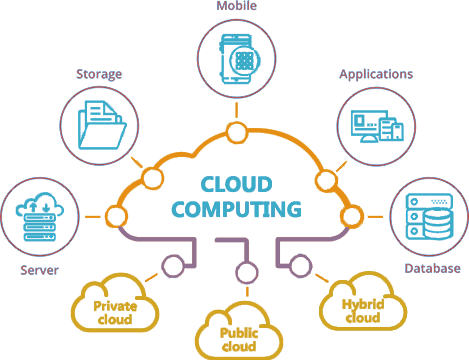
2. How is the cloud data centre different from a traditional data centre?
| Cloud Data Center | Traditional Data Center |
| Computing in the cloud (Internet) | On-premise hardware purchase and maintenance |
| Cost-efficient as you pay for what you use | High cost as you need to buy server and networking hardware |
| Easily and economically scalable | Costly and complex scaling of data centres |
| Cloud systems can be built quickly; well within a few minutes | Physical infrastructure can take from a few days to a few months to build |
3. What is a cloud service and what are its features?
Cloud service is a service or resource available on-demand for users over the internet. Services are designed to provide easy and economical access to applications, infrastructure and resources fully managed by a cloud server.
The features of the cloud service are:
- The ability to scale
- Cost-reduction
- Increased flexibility
- On-demand self-service
- Easy maintenance
- Large network access.
4. Define the following in terms of cloud computing: elasticity, scalability, reliability, and availability.
- Elasticity: The functionality where the cloud provider provisions resources based on demand. Cloud automatically adapts to workload changes by adding or removing resources at any given point.
- Scalability: Cloud computing can increase IT resources dynamically depending on changing demand.
- Reliability: You would expect the app or service in the cloud to be up and running at all times. Thus reliability means that you can access any service or resource from any location at any time, without any interruptions or downtime.
- Availability: Availability in cloud computing is the functionality of cloud servers to be up at all times, thereby providing system and services to the end-users on demand.
5. What are the different cloud architecture phases?
Different phases of cloud architecture are:
- Launch phase: Launch basic services and make system operations ready.
- Monitor phase: Monitor and manage services to ensure the user gets what he demands.
- Shutdown phase: Initially, shut down those services that are not in use. Next, shut down the remaining services; and at last the system services.
- Cleanup phase: Cleans up left out services that were either broken or did not properly shut down.
6. Mention the different data types supported by cloud computing
Cloud computing supports different data types, like Boolean, decimal, emails, text, locale, video, number, date, images, and contracts, etc. You can consider each new demand as a new data type.
7. What is on-demand functionality? How is it provided in the cloud?
On-demand functionality is the ability of the cloud to deliver computing and other services in real-time, based on user needs.
For instance, let’s say you have an on-premise server with 64 GB RAM and 100TB storage. Though you are using only 16 GB RAM and 10TB storage, you need to incur a cost for the entire infrastructure. On the other hand, if it were a cloud server, you are only required to pay for the 16GB RAM and 10TB storage, on-demand.
Cloud service providers have a control panel that allows them to view active and inactive servers and allocate them as per the demands of the user traffic. These are automated and the cloud server allocates resources without any downtime.
Fancy a challenge?
Cloud Architecture Interview Questions
8. What are the different types of cloud computing servicing models?
- Infrastructure as a Service (IaaS) - Provides hardware and networking components to businesses from the cloud infrastructure.
- Platform as a Service (PaaS) - Provides the developer with the cloud application platform.
- Software as a service (SaaS)- Provides applications as a service without having to install the software on the user’s system.
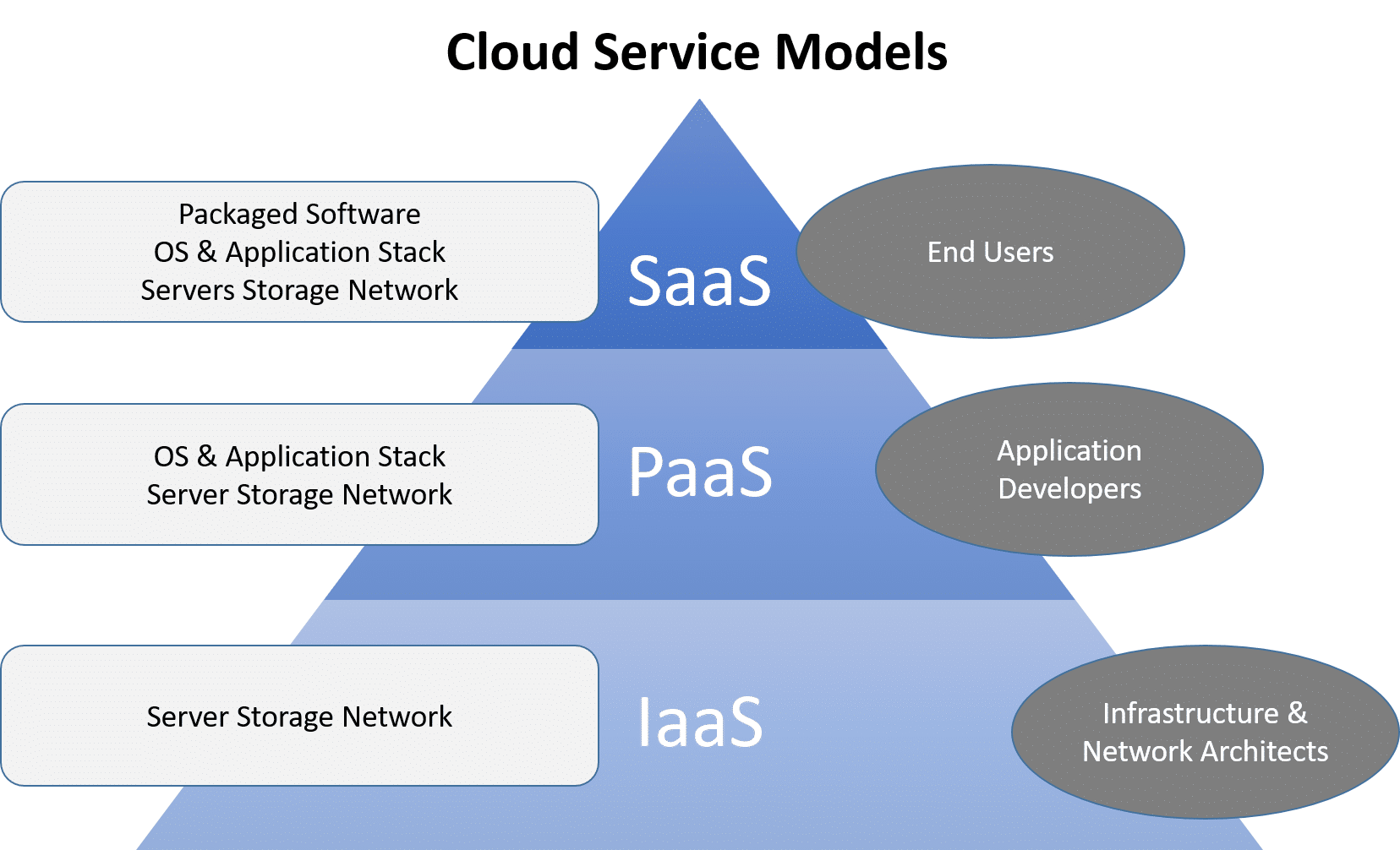
9. What are the different cloud deployment models?
Types of cloud computing deployment models:
- Private cloud: The cloud infrastructure is private to only a single organization and is managed either by the company itself or the cloud service provider. It is ideal for security intensive applications and organisations with heavy rules and regulations.
- Public cloud: Supports all users who want cloud services and resources on a subscription basis. It is ideal for developing and testing applications, and non-critical tasks such as file-sharing, and e-mail services, etc.
- Hybrid cloud: Users get an interconnected public and private cloud network. It is beneficial for situations where you require scaling an existing private cloud. The best way to scale up a cloud is through on-demand public cloud resources.
- Community cloud: Supports multiple organizations within a community that are sharing computing resources. For example, a group of colleges under the same university, state departments, etc. A community cloud access is restricted to the community members only.
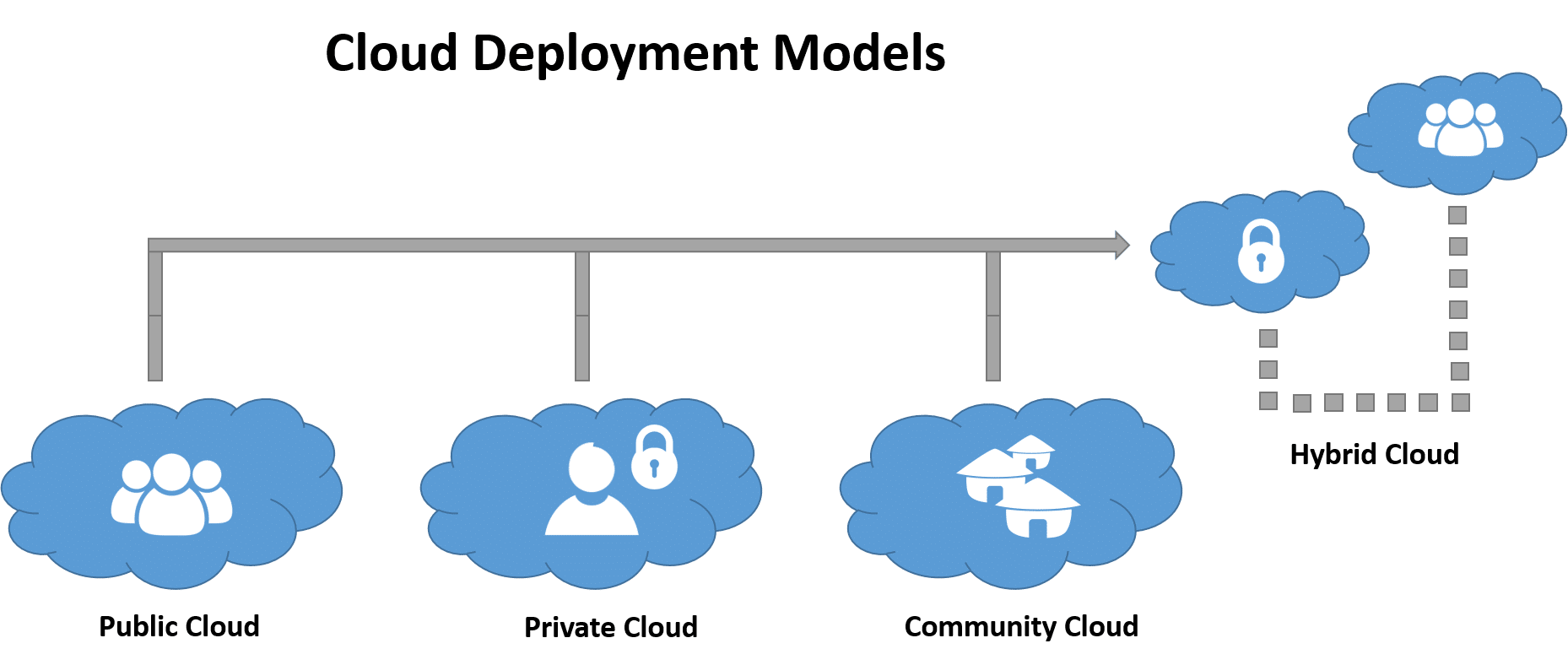
10. What are the layers of PaaS Architecture?
The 5 layers of PaaS architecture are:
- Deployment: Moves the application from the source machine or the developer’s machine to the PaaS.
- Provisioning: To create an environment suitable for running the app, PaaS provisions the following:
-
- Containers and compute instances
- Network
- Operating system services
- Libraries required to run the app.
- Lifecycle Management: After creating an environment to run the app, PaaS manages the lifecycle of the app through the following steps:
-
- Start the app
- Monitor the app's running state
- Monitoring app's resource consumption. Report for any anomaly
- If a failure occurs, restart the app.
- Stop or restart app based on commands
- Service Management: This is an optional phase. Some of the PaaS systems provide certain services that can run outside of the container or compute instance. A few of such services are databases, caches, network file systems, message queues, etc.
- Reporting: Monitors and reports various aspects of the application lifecycle like utilization, system performance, log files, and application metrics.
11. What are the modes on which software as a service (SaaS) functions?
- Simple multi-tenancy in cloud computing –Users have independent resources which they do not share with other users.
- Fine-grain multi-tenancy in cloud computing – Users share the resources with the same functionality from a common pool. However, the application permissions and data is not shared.
12. Mention a few platforms for large-scale cloud computing.
Apache Hadoop and MapReduce are two platforms used for large scale computing in the cloud technology space.
Cloud Optimization Interview Questions
13. Mention some optimization strategies in the cloud.
- Identify resources that are not in use.
- Merge all idle resources.
- Right-size your computing resources.
- Choose the appropriate storage types.
- Invest in reserved instances for long term cloud resources usage.
- Leverage spot instances for short term cloud usage.
- Delete unused elastic block store(EBS) snapshots.
14. What is the role of the performance cloud?
Performance cloud is beneficial when you need to transfer large amounts of data instantly. Usually, researchers and professionals working on high-performance computing use performance clouds.
15. Mention what is Hypervisor in cloud computing and its types?
A hypervisor or a virtual machine manager (VMM) is a type of virtualization software that the cloud server uses to divide and allocate the resources on the cloud hardware. When software provides partitioning, isolation or abstraction, it is known as a virtualization hypervisor.
There are two types of Hypervisor in cloud computing:
- TYPE-1 Hypervisor:
It runs directly on the underlying host system and has direct access to hardware resources. Examples include Microsoft Hyper-V hypervisor, VMware ESXi, and Citrix Xen Server.
- TYPE-2 Hypervisor:
It runs as an application on the Host system. Examples include VMware Player or Parallels Desktop.
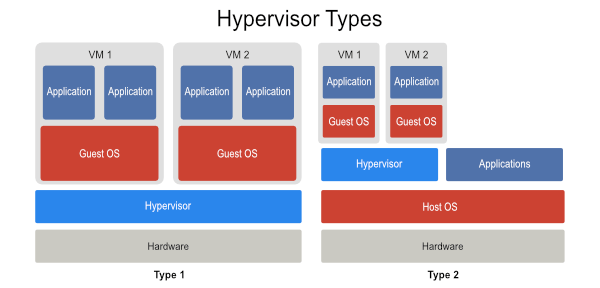
16. What do System Integrators do in cloud computing?
A System Integrator is a company or individual which helps in creating computing systems for the clients by bringing together software and hardware components from different vendors. In cloud computing, a System Integrator creates such cloud services or products thereby helping their client to navigate through the hardships of cloud migration. This process is also known as Integration as a Service.
Currently, many organizations deploy a hybrid cloud model which is complicated to navigate. In such scenarios, cloud system integrators could help by offering easy and quick deployment and self-provisioning.
Cloud Security Interview Questions
17. Which security laws would you implement to secure data in a cloud?
Following are the security laws to secure data in the cloud:
- Processing: Manages the processing of data ensuring that it is processed correctly and completely within an application.
- File: It manages and controls data integrity such, i.e., data shouldn't be manipulated in any files.
- Output reconciliation: Reconciles output data from input.
- Input validation: Controls and checks for erroneous input data.
- Security and backup: Manages security and backup and also controls security breach log.
18. What are some cloud security measures taken to ensure secure access to data and applications?
- Identity Management: It ensures that only the organization using cloud services can access the system and applications.
- Access Control: Restricts user access to specific data. Each user will require permission to access either company-specific data or data that belongs to other users.
- Authentication and Authorization: Only authorized and authenticated users can gain access to data and applications.
19. How do you secure your data transfer from a cloud?
You need to be certain of two things to ensure data is well protected while transporting in a cloud computing environment:
- Ensure no one can intercept your data as it transfers in a cloud from point X to point Y.
- Ensure that there are no data leaks from the cloud storage.
Another way to prevent a data threat during transport is by using a virtual private network (VPN). Essentially, a VPN converts your public network into a private network mimicking a dedicated connection. This is done by using a firewall and encryption mechanism.
Advanced Cloud Computing Interview Questions
20. What is 'Eucalyptus' and its usage in Cloud Computing?
EUCALYPTUS is an acronym for Elastic Utility Computing Architecture for Linking Your Program to Useful Systems.
It is open-source software that builds private and hybrid clouds compatible with AWS.
Moreover, it is an IaaS product that enables you to pool your computing, network, and storage resources and scale them up or down with changing application workloads.
21. Why do we use API in cloud computing?
Application Programming Interface (API) in cloud-computing is essential for the following reasons:
- Ease of development as the user doesn't have to write full-fledged programs.
- Makes an extensible platform that leads to a rich feature set.
- Speeds up the platform access
- Enables efficient management of platform security.
- Helps to co-opt with other cloud service providers.
- Ensures compliance
- Helps in successful integration and interoperability.
- Analytics are handled easily through API's
22. Mention the need for virtualization and the types of virtualization in cloud computing?
Virtualization in Cloud Computing is a foundational concept that creates an abstraction layer and hides the intricacies of underlying hardware and software. It is crucial for cloud implementation for the following reasons:
- Decouples hardware and software.
- Manages the service level policies.
- Creates an abstract layer between storage platforms and individual applications.
- Makes the delivery of cloud services easy
- Virtualization in cloud computing uses partitioning to support myriad operating systems and applications
Types of virtualization in cloud computing:
- Network virtualization
- Storage virtualization
- Server virtualization
- Data virtualization
- Desktop virtualization
- Application virtualization
23. What is packaged Hybrid Cloud? Give a few packaged hybrid cloud examples?
When a vendor-provided private cloud is packaged and bound to a public cloud, it is known as packaged hybrid cloud.
There are two more approaches to package a hybrid cloud:
- Like-for-like hybrid
- Layered technology hybrid
Few hybrid cloud examples are: AWS Outposts, Google Anthos, Azure Stack, Azure Arc, and VMware Cloud on AWS
24. Define what is a multi-cloud? What is a multi-cloud strategy?
The multi-cloud approach means that you are using one or more cloud computing services from multiple cloud vendors. Therefore, you would have more than one cloud deployment of a similar type, but from different vendors.
A multi-cloud strategy means that a company intelligently selects different cloud providers for different services. The decision is based on the fact that some providers are better in particular cloud services. For instance, only a few cloud platforms will provide efficient machine learning capabilities and large data transfers.
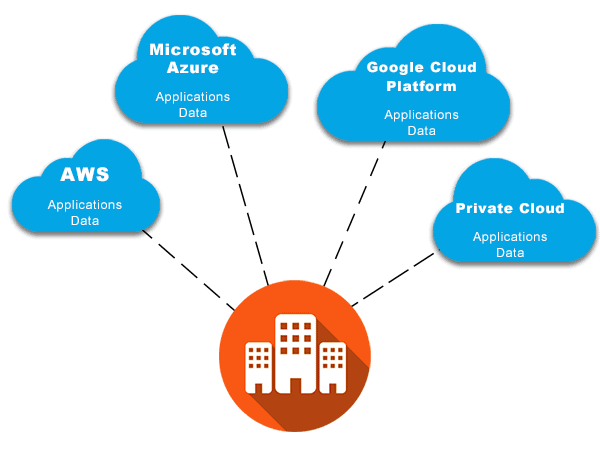
In this article, we focused on generic Cloud Computing Interview Questions. However, we would recommend you to go through AWS and Azure interview articles too. This will be a step closer to you cracking the cloud interview with ease.
Backend Technology Interview Questions
C Programming Language Interview Questions | PHP Interview Questions | .NET Core Interview Questions | NumPy Interview Questions | API Interview Questions | FastAPI Python Web Framework | Java Exception Handling Interview Questions | OOPs Interview Questions and Answers | Java Collections Interview Questions | System Design Interview Questions | Data Structure Concepts | Node.js Interview Questions | Django Interview Questions | React Interview Questions | Microservices Interview Questions | Key Backend Development Skills | Data Science Interview Questions | Python Interview Questions | Java Spring Framework Interview Questions | Spring Boot Interview Questions.
Frontend Technology Interview Questions
HTML Interview Questions | Angular Interview Questions | JavaScript Interview Questions | CSS Interview Questions
Database Interview Questions
SQL Interview Questions | PostgreSQL Interview Questions | MongoDB Interview Questions | MySQL Interview Questions | DBMS Interview Questions
Cloud Interview Questions
AWS Lambda Interview Questions | Azure Interview Questions | AWS Interview Questions
Quality Assurance Interview Questions
Moving from Manual Testing to Automated Testing | Selenium Interview Questions | Automation Testing Interview Questions
DevOps and Cyber Security Interview Questions
DevOps Interview Questions | How to Prevent Cyber Security Attacks | Guide to Ethical Hacking | Network Security Interview Questions
Design Product Interview Questions
Product Manager Interview Questions | UX Designer Interview Questions
Interview Preparation Tips
Strength and Weakness Interview Questions | I Accepted a Job Offer But Got Another Interview | Preparation Tips For the Virtual Technical Interview | 7 Tips to Improve Your GitHub Profile to Land a Job | Software Engineer Career Opportunities in Singapore | What can you expect during a whiteboard interview | How To Write A Resignation Letter | Recommendation Letter Templates and Tips.
Quick Links
Practice Skills | Best Tech Recruitment Agency in Singapore, India | Graduate Hiring | HackerTrail Litmus | Scout - Sourcing Top Tech Talent in ONE Minute | About HackerTrail | Careers | Job Openings.






